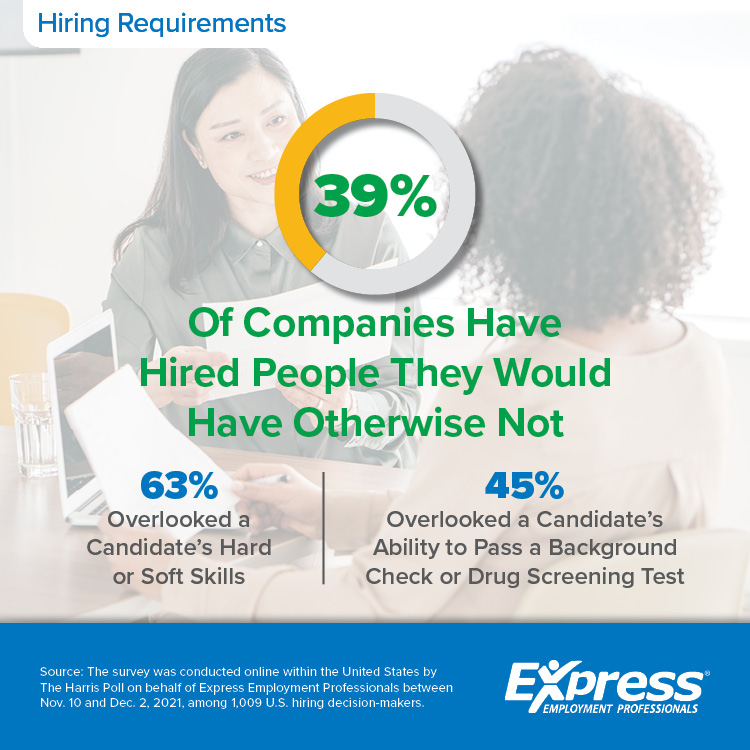Nearly Half of Companies Have Recently Hired Out of Desperation
Brighton/Howell MI - March 23, 2022
Struggling with a depleted applicant pool, nearly 2 in 5 businesses (39%) report hiring someone they otherwise would not have in order to fill an open position, according to a new survey from The Harris Poll commissioned by Express Employment Professionals.
This statistic increases with company size to 47% of companies with more than 500 employees, 46% of companies with 100 - 499 employees, 47% of companies with 50 - 99 employees, 29% of those with 10 - 49 employees and 25% of those with 2 - 9 employees.
Of those who have hired a candidate they would have traditionally overlooked, roughly 3 in 5 (63%) say they have overlooked soft or hard skills, while 45% have overlooked an applicant's ability to pass a background check or drug screening.

More optimistically, however, there may be an end in sight for hiring woes with nearly two-thirds (66%) of hiring decision-makers believing the tight labor market will end before 2023.
As for what skills job seekers are lacking, Nancy Reed, Express franchise owner in Texas, says employers are looking for problem solving skills, critical thinking, ability to be a team player, adaptability, flexibility, dependability and technical skills.
"Businesses are willing and have been overlooking traditional hiring requirements," she said. "They are having to make critical hiring decisions due to the lack of available workers and growing demands."
A lack of recent work history and skillsets are two of the biggest challenges in Washington for Express franchise owner Stacey Snodgrass.
"So many people exiting the workforce during COVID has left a large gap, and employers are wanting people with recent work history," she said. "We have job orders for higher-level skilled trades positions that are hard to fill in our offices."
One of the more controversial traditional hiring requirements modified or eliminated to fill positions has been drug testing.
"Some companies dropped this pre-employment requirement during COVID to onboard people faster, and while a few have changed the process to drug test now, you will still have to complete one when hired, as required by law," Snodgrass added. "We have not seen this requirement dropped for any positions that are safety-sensitive."
Instead of making subpar hires, companies should create their own qualified workforce through training.
"Companies are constantly battling high turnover due to market conditions," Reed said. "It makes more sense to give an opportunity to a loyal employee and invest in them directly versus hiring someone experienced who will leave for another job. We are seeing businesses investing more in training and are going back to the concept of 'building your own' to create a strong workforce from within."
And Reed is encouraged by the potential for the labor pool to grow in the next year if COVID-19 continues to subside.
"The workforce that was waiting to return are now searching for new professional opportunities," she said. "I see it in our offices and applicant tracking every day. Job seekers are now accepting positions more frequently and starting to get back to work."
Eliminating barriers to employment is pivotal to pulling workers off the sidelines, according to Express Employment International CEO Bill Stoller.
"However, careful considerations for the safety and health of colleagues must be taken into account when waiving employment requirements," he said. "With the right investments in training and education, companies can create their qualified workers ready to mentor the next generation."
Survey Methodology
The survey was conducted online within the United States by The Harris Poll on behalf of Express Employment Professionals between Nov. 10 and Dec. 2, 2021, among 1,009 U.S. hiring decision-makers (defined as adults ages 18+ in the U.S. who are employed full-time or self-employed, work at companies with more than one employee, and have full/significant involvement in hiring decisions at their company). Data were weighted where necessary by company size to bring them into line with their actual proportions in the population.